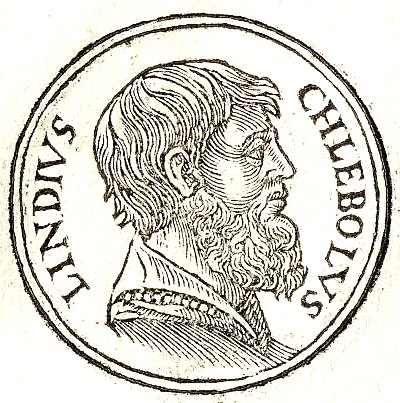Cleobulus on:
[Wikipedia]
[Google]
[Amazon]
 Cleobulus (; el, Κλεόβουλος ὁ Λίνδιος, ''Kleoboulos ho Lindios''; fl. 6th century BC) was a Greek poet and a native of
Cleobulus (; el, Κλεόβουλος ὁ Λίνδιος, ''Kleoboulos ho Lindios''; fl. 6th century BC) was a Greek poet and a native of
I am a brazen maiden lying here
Upon the tomb of Midas. And as long
As water flows, as trees are green with leaves,
As the sun shines and eke the silver moon,
As long as rivers flow, and billows roar,
So long will I upon this much wept tomb,
Tell passers by, "Midas lies buried here.
The Suda mentions him, and farther down, his daughter Cleobulina. An epigram of his is in the Palatine Anthology (VII, 153), and in another place records two epigrams together as "One of Homer, or of Cleobulus, without specifying which is the latter's. French scholar Pierre Waltz analyzed the problem in the ''Anthologie Grecque'' Likewise an
 Cleobulus (; el, Κλεόβουλος ὁ Λίνδιος, ''Kleoboulos ho Lindios''; fl. 6th century BC) was a Greek poet and a native of
Cleobulus (; el, Κλεόβουλος ὁ Λίνδιος, ''Kleoboulos ho Lindios''; fl. 6th century BC) was a Greek poet and a native of Lindos
Lindos (; grc-gre, Λίνδος) is an archaeological site, a fishing village and a former municipality on the island of Rhodes, in the Dodecanese, Greece. Since the 2011 local government reform it is part of the municipality Rhodes, of which it ...
. He is one of the Seven Sages of Greece.
Life
Cleobulus was the son of Evagoras and a citizen ofLindus Lindus or Lindos ( gr, Λίνδος) was one of the most important towns in ancient Rhodes. It was situated on the eastern coast, a little to the north of a promontory bearing the same name. The district was in ancient times very productive in wine ...
in Rhodes. Clement of Alexandria
Titus Flavius Clemens, also known as Clement of Alexandria ( grc , Κλήμης ὁ Ἀλεξανδρεύς; – ), was a Christian theologian and philosopher who taught at the Catechetical School of Alexandria. Among his pupils were Origen an ...
called Cleobulus king of the Lindians, and Plutarch spoke of him as the tyrant. The letter quoted by Diogenes Laërtius
Diogenes Laërtius ( ; grc-gre, Διογένης Λαέρτιος, ; ) was a biographer of the Greek philosophers. Nothing is definitively known about his life, but his surviving ''Lives and Opinions of Eminent Philosophers'' is a principal sourc ...
, in which Cleobulus invites Solon to Lindus as a democratic place of refuge from the tyrant Peisistratus
Pisistratus or Peisistratus ( grc-gre, Πεισίστρατος ; 600 – 527 BC) was a politician in ancient Athens, ruling as tyrant in the late 560s, the early 550s and from 546 BC until his death. His unification of Attica, the triangular ...
in Athens, is undoubtedly a later forgery. Cleobulus is also said to have studied philosophy in Egypt.Diogenes Laërtius, i. 89 He had a daughter, Cleobulina Cleobulina (''Κλεοβουλίνη'', 6th century BC) or Eumetis was an ancient Greek poet. She was known for writing riddles, and three riddles attributed to her survive.
According to Athenaeus and Diogenes Laërtius, Cleobulina came from Lindos ...
, who found fame as a poet, composing riddles in hexameter verse. Cleobulus is said to have lived to the age of seventy, and to have been greatly distinguished for strength and beauty of person.
Extant fragments
Cleobulus apparently wrote lyric poems, as well as riddles in verse. Diogenes Laërtius also ascribes to him the inscription on the tomb of Midas, of which Homer was considered by others to have been the author:enigma
Enigma may refer to:
*Riddle, someone or something that is mysterious or puzzling
Biology
*ENIGMA, a class of gene in the LIM domain
Computing and technology
* Enigma (company), a New York-based data-technology startup
* Enigma machine, a family ...
is attributed to him is recorded in the Palatine Anthology (XIV).
Many sayings were attributed to Cleobulus:
*"Ignorance and talkativeness bear the chief sway among men."
*"Cherish not a thought."
*"Do not be fickle, or ungrateful."
*"Be fond of hearing rather than of talking."
*"Be fond of learning rather than unwilling to learn."
*"Seek virtue and eschew
{{Short pages monitor